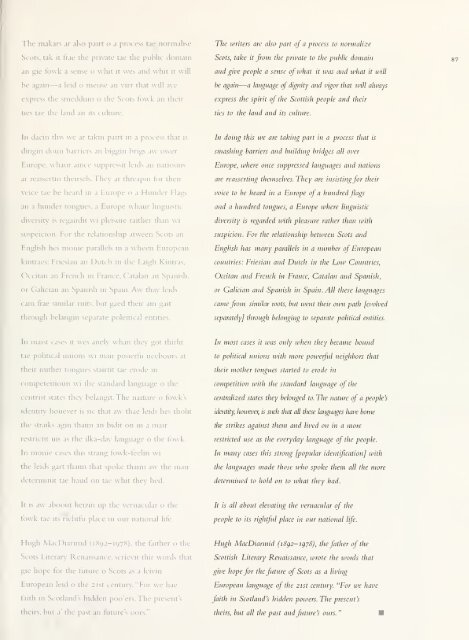SCOTLAND - Smithsonian Digital Repository - Smithsonian Institution
SCOTLAND - Smithsonian Digital Repository - Smithsonian Institution
SCOTLAND - Smithsonian Digital Repository - Smithsonian Institution
Create successful ePaper yourself
Turn your PDF publications into a flip-book with our unique Google optimized e-Paper software.
The makars ar also pairt o a process tae normalise<br />
Tlie writers are also part of a process to<br />
normalize<br />
Scots, tak it frae the private tae the public domain<br />
Scots, take it from the private to<br />
the public domain<br />
an gie fowk a sense o whit it wes and whit it will<br />
and give people a sense of what it was and what it will<br />
be again—a leid o mense an virr that will aye<br />
be again— a language of dignity and vigor that<br />
mil always<br />
express the smeddum o the Scots fowk an their<br />
ties tae the land an its culture.<br />
express the spirit of the Scottish people and their<br />
ties to the land and its culture.<br />
In daein this we ar takin pairt in a process that is<br />
dingin doun barriers an biggin brigs aw ower<br />
Europe, whaur aince suppressit leids an natiouns<br />
ar reassertin theirsels.They ar threapin for their<br />
veice tae be heard in a Europe o a Hunder Flags<br />
an a hunder tongues, a Europe whaur linguistic<br />
7(1 doing this we are taking part in a process that is<br />
smashing barriers and building bridges all over<br />
Europe, where once suppressed languages and nations<br />
are reasserting themselves. Jliey are insisting for their<br />
voice to be heard in a Europe of a hundred flags<br />
and a hundred tongues, a Europe where linguistic<br />
diversity is<br />
regairdit wi pleisure raither than wi<br />
diversity is<br />
regarded with pleasure rather than with<br />
suspeicion. For the relationship atween Scots an<br />
English hes nionie parallels in a wheen European<br />
suspicion. For the relationship between Scots and<br />
English has many parallels in a number of European<br />
kintraes: Friesian an Dutch in the Laigh Kintras,<br />
countries: Friesian and Dutch in<br />
the Low Countries,<br />
Occitan an French in France. Catalan an Spanish,<br />
Occitan and French in<br />
France, Catalan and Spanish,<br />
or Galician an Spanish in Spain. Aw thay leids<br />
or Galician and Spanish in<br />
Spain. All these languages<br />
cam frae similar ruits, but gaed their ain gait<br />
through belangin separate poleitical entities.<br />
came from similar roots, but went their own path [evolved<br />
separately] through belonging to separate political entities.<br />
In maist cases it<br />
wes anely whan they got thirlit<br />
tae political unions wi mair pouerfii neebours at<br />
their mither tongues stairtit tae erode in<br />
In most cases it was only when they became bound<br />
to political unions with more powerful neighbors that<br />
their mother tongues started to erode in<br />
competeitioun wi the standard language o the<br />
competition with the standard<br />
language of the<br />
centrist states they belangit.The naiture o fowk's<br />
identity houever is sic that aw thae leids hes tholit<br />
centralized states they belonged to. The nature of a people's<br />
identity, however, is such that all these languages have borne<br />
the straiks agin thaim an bidit on in a mair<br />
the<br />
strikes against them and lived on in a more<br />
restrictit uis as the ilka-day language o the fowk.<br />
restricted use as<br />
the everyday language of the people.<br />
In monie cases this Strang fowk-feelin wi<br />
In many cases this strong [popular identification] tvith<br />
the leids gart thaim that spoke thaim aw the mair<br />
determinit tae hand on tae whit they hed.<br />
the languages made those who spoke them all<br />
determined to hold on to what they had.<br />
the more<br />
It is<br />
aw aboout heizin up the vernacular o the<br />
It is all about elevating the vernacular of the<br />
fowk tae its richtfli place in our national life.<br />
people to its rightful place in our national life.<br />
Hugh MacDiarmid (1892—1978), the faither o the<br />
Hugh MacDiarmid (iSgz—igyS), the father of the<br />
Scots Literarv' Renaissance, scrievit thir words that<br />
Scottish<br />
Literary Renaissance, wrote the words that<br />
gie hope for the future o Scots as a leivin<br />
give hope for the future of Scots as a liimg<br />
European leid o the 21st century. "For we hae<br />
European language of the 21st century.<br />
"For we have<br />
faith in Scotland's hidden poo'ers.The present's<br />
theirs, but a" the past an fiiture's oors."<br />
faith in Scotland's hidden powers. The present's<br />
theirs, but all the past and future's ours. "
















